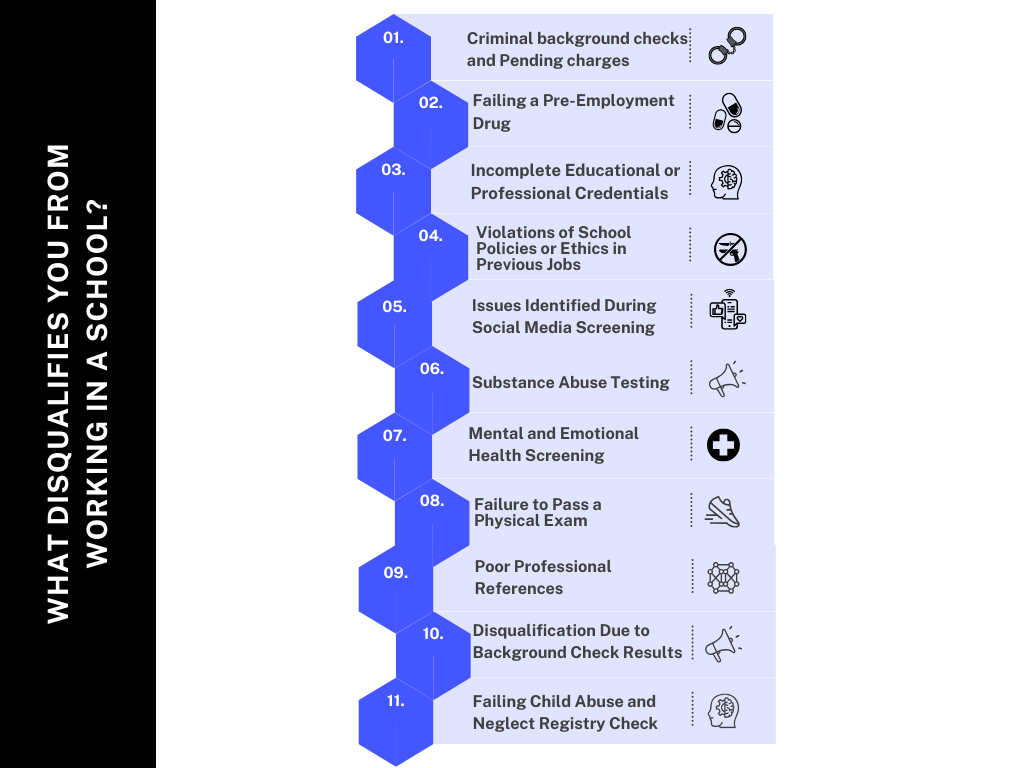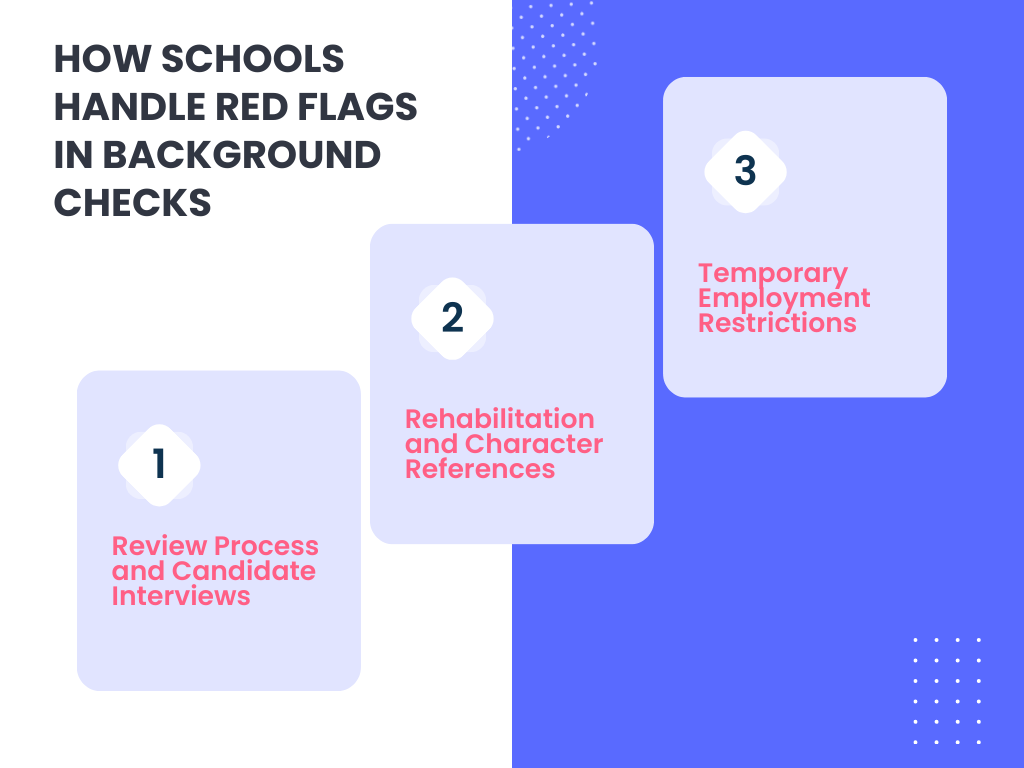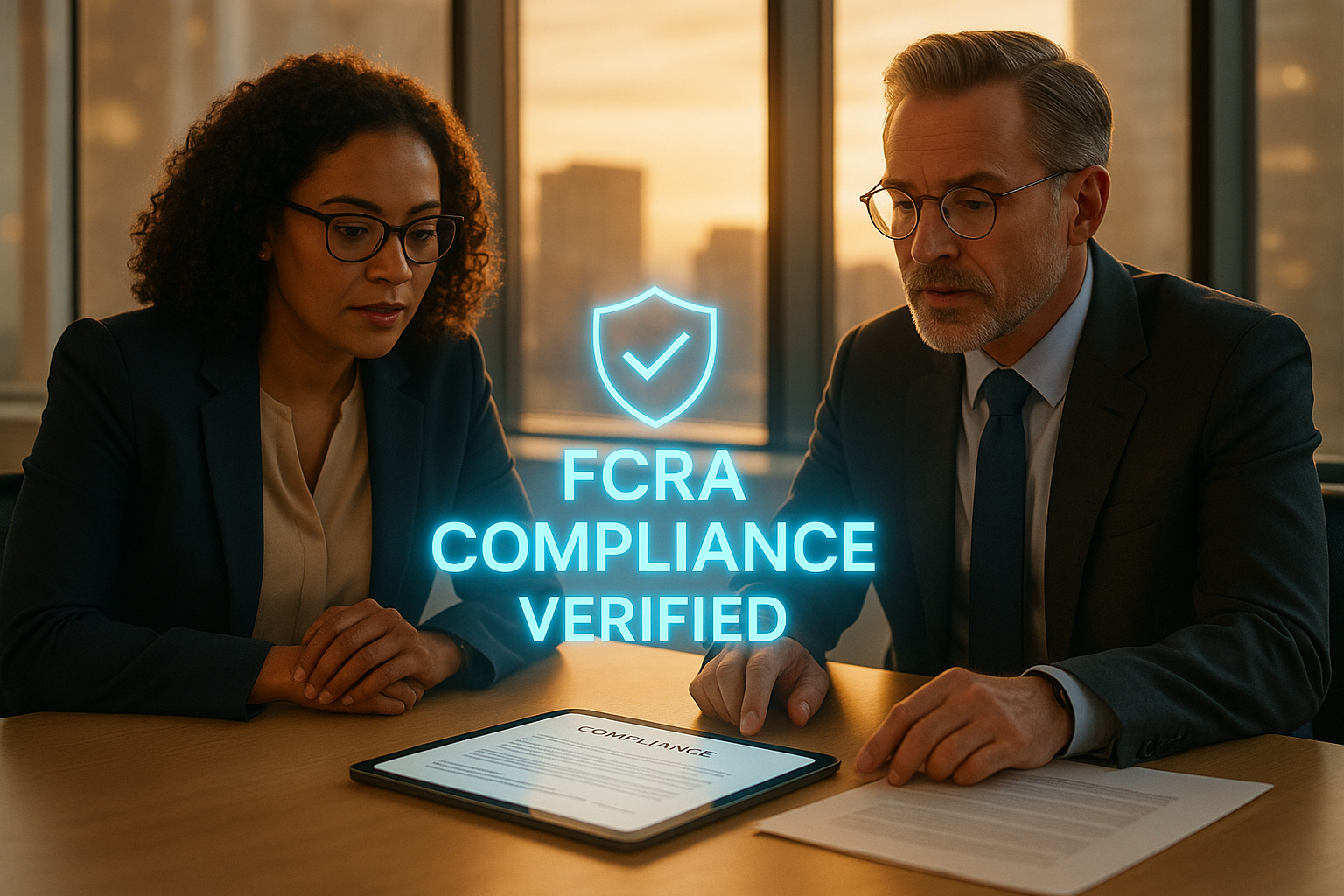What Disqualifies You From Working in a School?

Working in a school and educational sector requires a high level of trust and responsibility, as it involves directly influencing young lives and ensuring their safety. As a result, schools have strict hiring processes, including comprehensive background checks, to assess a candidate's eligibility for these sensitive roles.
And a background check is a process used by an organization or person to confirm that an individual is who they claim to be, and check their past record to verify education, employment history, and other activities, as well as check for a criminal record. For more on the benefits of AI in background checks, see our article on Background check with AI.
If you're preparing for a role in a school setting, understanding what could disqualify an employee is crucial. Here’s a detailed look at factors that may prevent employees from being hired in a school.

1. Criminal Background Checks and Pending Charges
Criminal history checks are crucial in the school hiring process to ensure a safe environment for both students and staff. These checks assess records at county, state, and federal levels and focus on certain crimes that can disqualify candidates.
- Violent Crimes: Any history of violent offenses, such as assault, battery, or domestic violence, is a serious concern. Schools need to ensure a safe environment, so individuals with violent histories are typically disqualified.
- Sexual Offenses: Offenses involving sexual misconduct, such as sexual assault, child exploitation, or pornography, are immediately disqualifying. Protecting minors is a top priority for schools, and a history of sexual offenses is a major red flag.
- Drug-Related Offenses: A criminal record involving illegal drugs can raise concerns about a candidate's judgment, reliability, and ability to serve as a role model. This includes offenses related to drug possession, distribution, or use.
- Theft and Financial Crimes: Crimes like theft, fraud, and embezzlement are serious issues, especially in roles where staff members handle school funds or sensitive student information. Trustworthiness is essential in schools, and financial crimes undermine this.
- Seriour Felonies: such as homicide, kidnapping, or human trafficking are among the most severe crimes and generally disqualify individuals from working in schools due to the high risks they pose.
2. Failing a Pre-Employment Drug Test
Drug testing is part of the hiring process to ensure a drug-free workplace, especially for positions involving direct interaction with students. A failed drug test suggests impaired judgment and could be grounds for disqualification. Ensuring that school employees are free from substance abuse is critical to maintaining a safe environment.
3. Incomplete Educational or Professional Credentials
Schools require certain educational degrees and professional certifications, and not having the necessary credentials can disqualify a candidate. This includes:
- Teaching Certifications: Teachers must have appropriate degrees and state-issued certifications to ensure they are qualified to teach the subject matter.
- Specialized Certifications: For roles such as special education or health education, schools may require additional certifications or qualifications. Lack of these could result in disqualification.
4. Violations of School Policies or Ethics in Previous Jobs
A history of policy violations or unethical behavior in previous jobs is a significant red flag. Schools prioritize professionalism and responsibility. Examples of disqualifying behavior include:
- Misconduct: Harassment, insubordination, or neglecting duties are concerning behaviors that suggest the candidate may not be fit for the responsibility of working with students.
- Demonstrated Accountability: Schools prefer individuals who have shown they can adhere to ethical standards and handle responsibilities properly. A history of rule violations signals the opposite.
5. Issues Identified During Social Media Screening
Many schools now screen candidates' social media profiles to evaluate their professionalism and character. Here's what they look for:
- Privacy Settings and Employer Access: Candidates should ensure their social media accounts are secure and set to private if there’s any inappropriate content. Inappropriate public content could hinder a candidate’s chances.
- Managing Professional Image Online: A professional, responsible online presence is crucial. Schools look favorably on candidates who maintain a respectable and professional persona online.
- Avoiding Controversial or Sensitive Content: Posts with divisive political views or offensive language can raise concerns. Schools want employees who can interact respectfully with students from diverse backgrounds and maintain a neutral and inclusive environment.
For more information on the importance of social media screenings on the hiring process, schools can review best practices in online reputation management.
6. Substance Abuse Testing
Substance abuse testing is a crucial part of the hiring process for schools, especially for positions where candidates will have direct interaction with students. The goal is to ensure that prospective employees are free from substance abuse issues that could impair their judgment, behavior, or overall job performance.
Testing is particularly relevant in roles where maintaining a safe, professional environment is essential, such as teaching, coaching, or administrative positions. A failed substance abuse test could signal to schools that the candidate might be a risk to the well-being of students and staff, as it may indicate issues with decision-making, focus, or reliability. Therefore, failing this test often results in disqualification from the hiring process.
Schools rely on these screenings to maintain a drug-free and safe environment where students can thrive and be protected.
7. Mental and Emotional Health Screening
The mental and emotional health of school employees is critical in maintaining a supportive environment for students. Some schools assess the emotional stability of candidates to ensure they can manage the stress and responsibilities of the job.
Mental health issues are generally reviewed on an individual basis. Schools aim to support candidates with mental health challenges, provided they can demonstrate resilience and coping skills that are necessary for the job.
8. Failure to Pass a Physical Exam
Certain positions, such as physical education instructors or sports coaches, may require candidates to pass a physical exam to demonstrate they can physically meet the demands of the job.
For instance, a physical education teacher must be physically capable of leading activities, while coaches must be fit enough to engage in practices and sports events. A failed physical exam may disqualify candidates from these roles.
9. Poor Professional References
References from previous employers provide valuable insight into a candidate’s professionalism and reliability. Schools rely heavily on references to confirm that a candidate has the required work ethic and responsibility.
If references indicate that the candidate has had issues with reliability, unprofessional behavior, or a lack of cooperation, the candidate may be disqualified. Schools expect their staff to demonstrate respect and professionalism.
10. Disqualification Due to Background Check Results
Background checks are a fundamental part of the hiring process in schools. If the check reveals serious criminal behavior, particularly involving violence or sexual misconduct, a candidate is likely to be disqualified.
Some minor offenses may not result in disqualification, but serious offenses, such as violent crimes, theft, or drug-related charges, usually disqualify candidates from consideration.
11. Failing Child Abuse and Neglect Registry Check
School employees are required to undergo a child abuse and neglect registry check to ensure they are not listed as having committed any abuse or neglect in the past.
If a candidate is found on the registry, they are immediately disqualified from employment. This is one of the most critical safeguards to protect children in school environments.
By understanding these disqualifying factors, school administrators can ensure they are hiring individuals who will maintain a safe, professional, and supportive environment for students.
Read Also: Background Check for School Employees
Why Background Checks Are Important in Schools
Background checks in schools are important for creating a secure learning environment. Since 70% of job applicants have lied or would consider lying on their resumes, careful screening helps to prevent false information. Learn more about why this statistic matters by reading 70% of job applicants have lied.
- Protecting Student Safety: The primary reason for background checks is to safeguard students from potential harm by identifying any risks in a candidate’s history.
- Building a Trustworthy and Professional Staff: By thoroughly screening all school employees, schools ensure a reliable and qualified team dedicated to a safe and constructive learning atmosphere.
- Preventing Misconduct and Unethical Behavior: Background checks can help identify past occurrences of misconduct or unethical behavior, reducing the chances of similar actions happening within the school.
- Compliance with Legal and Regulatory Requirements: Schools must follow specific state and federal guidelines to ensure they are hiring within legal parameters and protecting all stakeholders involved.
- Improving Community Confidence: Knowing that the school performs thorough background checks reassures parents, guardians, and the community that the school prioritizes safety and professionalism.
- Screening for Roles Beyond Teaching: Background checks are performed not only for teachers but also for other positions in the school, such as office staff, coaches, and volunteers who work with students.
- Encouraging a Positive School Culture: When all staff members follow to high standards of conduct, it helps create a respectful and supportive atmosphere for students.
- Screening for Patterns of Behavior: Background checks provide schools with information about past actions of candidates, allowing them to determine if an applicant aligns with their values and expectations.
Legal Protections for Applicants: Fair Hiring Practices and Rights
Applicants for school jobs have important rights during background checks to ensure they are treated fairly. Schools must follow certain legal regulations to protect applicants and guarantee a just hiring process. Here are the key protections:
- Fair Credit Reporting Act (FCRA): The FCRA governs the process of conducting background checks. It guarantees that the information collected is accurate and that applicants are informed if a background check will influence hiring decisions. Schools must obtain the applicant's consent before performing a check and must notify them if their application is denied based on the findings. For more information, refer to our article on the Fair Credit Reporting Act (FCRA).
- Ban the Box Laws: States and local jurisdictions have implemented Ban the Box laws, which stop employers from inquiring about criminal records at the beginning of the hiring process. This gives applicants the opportunity to be evaluated based on their skills and experience before their criminal history is taken into account.
- Rehabilitation and Disqualification Appeals: If an applicant is disqualified from a school position because of previous offenses, they may have the option to appeal the decision or show proof of their rehabilitation.
These legal protections ensure that applicants are treated fairly and not unfairly discriminated against based on their past records. Schools must adhere to these guidelines to maintain fairness in their hiring practices.
How Schools Handle Red Flags in Background Checks

Schools have procedures for handling issues identified in background checks:
- Review Process and Candidate Interviews: After identifying red flags in a background check, schools often conduct a thorough review process. This may include collecting more information or inviting the candidate to explain the findings during an interview. During this meeting, the school can ask for clarification, hear the candidate’s side of the story, and determine whether the concern is a minor issue or something that would disqualify them from working in the school.
- Rehabilitation and Character References: Schools may take into account the rehabilitation efforts of candidates with past mistakes. If a candidate has shown a commitment to change—like completing engaging in community service—this can be beneficial to their application. Schools appreciate character references from former employers, mentors, or community leaders who can attest to the candidate’s personal growth, current conduct, and overall fitness for the position.
- Temporary Employment Restrictions: Schools may decide to offer temporary employment while further reviewing the background of candidate. This can be especially common for individuals with minor offenses that don’t pose an immediate threat but require further assessment. Temporary employment restrictions could include working under supervision or in limited roles until the candidate’s qualifications are fully verified.
For more on how AI can streamline background checks, visit our article on Background check with AI. You can also Request a Demo to learn how Ferretly's AI tools can support your hiring process.
How Ferretly Will Help Educational Sector in Background Check?
Ferretly improves background checks in the education sector by using AI-powered screening to streamline the process and provide data analysis. Ferretly allows school administrators to quickly assess candidates, while customizable reports ensure they receive related information tailored to their needs.
Ferretly offers real-time monitoring of employees, helping schools maintain compliance with legal standards and monitor ongoing risk. By automating and simplifying background checks, Ferretly enables schools to hire safely and efficiently, ensuring that all individuals interacting with students are vetted.
Frequently Asked Questions
1 - What is a teacher background check?
Teacher background checks verify identity, criminal history, and employment or education history, ensuring candidates meet safety standards for working in schools.
2 - What does a school background check look for?
School background checks typically examine a candidate’s criminal record, professional credentials, and may include drug tests, social media screenings, and other safety assessments.
3 - Do schools do background checks?
Most colleges conduct background checks on prospective students; however, not all applicants are automatically rejected. Studies show that 66.4% of colleges collect criminal background information on at least some applicants.
4 - Do schools do background checks on parents and students?
The average parent is not required to undergo a school background check, except for volunteers such as tutors, chaperones, youth sports coaches, or classroom aides.
5 - Do Schools Hire Felons?
Some crimes might not stop someone from getting a job, but convictions for sex offenses, violent crimes, specific drug crimes, child abuse, and other serious felonies usually disqualify a person from working in schools.
6 - How Long Does a School Background Check Take?
The time it takes to complete a background check can differ, but many schools try to finish them within a week to speed up hiring.
7 - Can I Become a Teacher With a Criminal Record?
It might be possible to become a teacher with a criminal record, depending on the type of crime and local laws, but each situation is looked at individually.






